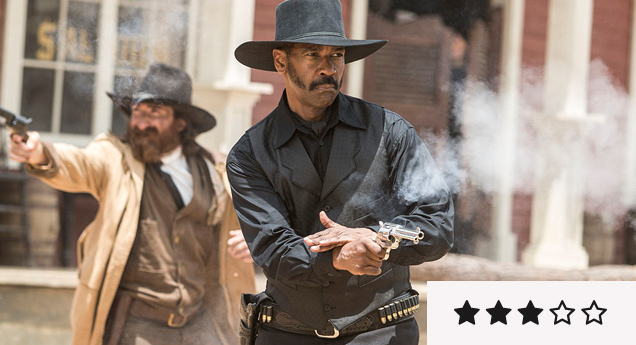Review: ‘The Magnificent Seven’ and its Surface-Level “Wokeness”
The Magnificent Seven is an agreeable remake, not bad for an Antoine Fuqua flick, if ultimately an unmemorable movie. Written by Nic Pizzolatto (of True Detective infamy) and Richard Wenk (of The Expendables 2 infamy), this update of the iconic 1960 John Sturges western – itself a redo of Akira Kurosawa’s classic Seven Samurai – is evidently informed by a […]

The Magnificent Seven is an agreeable remake, not bad for an Antoine Fuqua flick, if ultimately an unmemorable movie. Written by Nic Pizzolatto (of True Detective infamy) and Richard Wenk (of The Expendables 2 infamy), this update of the iconic 1960 John Sturges western – itself a redo of Akira Kurosawa’s classic Seven Samurai – is evidently informed by a surface-level “wokeness” that’s attuned to our sociopolitical zeitgeist.
The core cast of motley gun-for- hire drifters is drawn from a more diverse ethnic pool than previously managed. It also locates a headstrong female character in Jennifer Lawrence dead ringer Haley Bennett, who plays vengeful boss to the men while acquiring enough badass moves for us to imagine what Katniss might’ve been if she ever set foot in the wild west.
However, nothing about the film’s handling of race issues comes close to the bristly provocations of Tarantino’s last two westerns, Django Unchained and The Hateful Eight. This Seven mainly hews to its time-tested source template, with Fuqua ticking off familiar crowd- pleasing beats – those grand notions of brotherhood and selflessness that come from strangers banding together to liberate poor, God-fearing villagers from capitalist oppressors.
Even if he remains one of the least distinctive, graceless, action directors on the planet, Fuqua feels more present in the set-pieces than he’s ever been, lending a Peckinpah-esque ferocity to the bullet- strewn, high body count climax.
The flinty, leathery cool of the original ensemble is missed, but Denzel Washington and Chris Pratt, both staying well within their comfort zones, are fine in the Yul Brynner and Steve McQueen roles, and a few character revisions, like Vincent D’onofrio’s scalp-hunting man-bear, give this one the colourful kick it needs.
More on ‘The Magnificent Seven’ & movie times (when available)





















